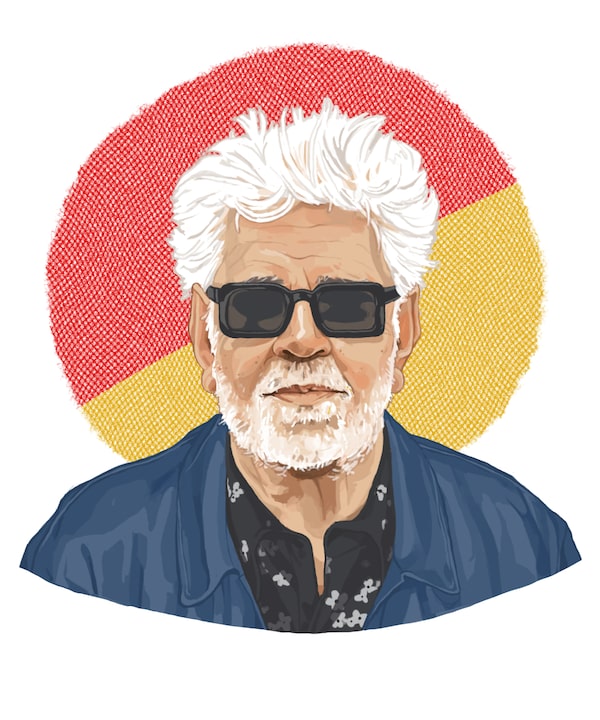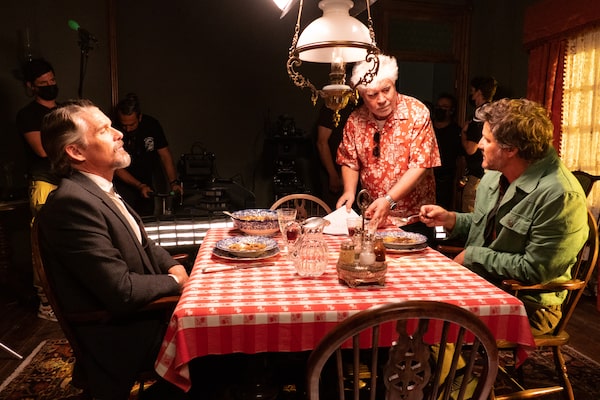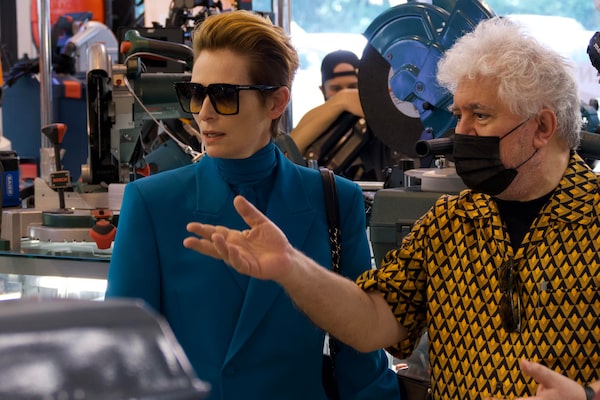
Pedro Almodóvar, Spain’s most celebrated filmmaker.Illustration by Ashley Floréal
Across his decades-long career, Pedro Almodóvar has collaborated with – and introduced to global audiences – Spain’s most talented performers: Antonio Banderas, Penelope Cruz, Carmen Maura, Rossy de Palma. But the prolific, legend-in-his-own-time filmmaker has long sought to expand his literal and metaphorical borders by working with actors outside his native language.
Almost a decade ago, Almodóvar nearly teamed up with Meryl Streep for an adaptation of an Alice Munro short story, until that project morphed into 2016′s Spanish-language drama Julieta. Even further back, Almodóvar almost directed Brokeback Mountain. Possibly it is that missed opportunity that fuelled the director’s latest production: Strange Way of Life, a western that stars Ethan Hawke and Pedro Pascal as two gunslingers who reunite decades after a passionate affair. The short film marks Almodóvar’s second English-language project, and will be released theatrically this weekend alongside his first, the 2020 short The Human Voice, starring Tilda Swinton.
While attending the Toronto International Film Festival last month, Spain’s most celebrated filmmaker sat down with The Globe and Mail to discuss cinema and sex.

From left, Ethan Hawke, Pedro Almodóvar and Pedro Pascal on the set of Strange Way of Life.Iglesias Más/El Deseo/Courtesy of Sony Pictures Classics
I can’t recall the last time a director was able to get audiences excited about going out to the theatre to watch short films …
It is a lot of attention for a 30-minute film. But I remember when I was promoting Pain and Glory, and the five directors up for the Goyas, which is the Oscars of Spain, were asked, “What’s the latest project?” All of them were working on series for the streaming platforms. And everybody was surprised when I said I wanted to make a short. But with the short format, I felt much more free. I could experiment more than if it were a long feature. You can concentrate exactly on what you want to say.
So there was no temptation as you were working on Strange Way of Life to use it as the basis for a longer feature later on?
No, I wouldn’t dare make a longer feature of this. I just wanted to make a story about these two former lovers, and that’s it. I didn’t want to make a whole western adventure. Also, it was a case of seeing if I could make a movie in English, or at least a short in English. I had a wonderful relationship with Tilda on The Human Voice, so it was nice to have the same with Ethan and Pedro. I’ve been told I need to make a third short now to complete a trilogy. But the next one will be a long feature.

Tilda Swinton and Almodóvar on the set of The Human Voice.Iglesias Mas/El Deseo/Courtesy of Sony Pictures Classics
Will that be an English-language feature, now that you’ve built up your confidence?
Well, it doesn’t mean that the confidence is real. It’s a way that I feel, but perhaps one is emboldened. I might have many more problems than I think.
Why the desire to work outside of Spanish? Is it just so you can work with American and European performers?
It’s exactly about the possibility of working with more actors. I’ve always wanted to work with Tilda. And in the case of Strange Way of Life, it’s a western, which is such an iconic American genre that it demands it be in English. I didn’t want to make something anachronistic, even though we have a long history in Spain of shooting spaghetti westerns here. But even Sergio Leone shot those in English.
It’s interesting to see the hold that westerns have on filmmakers. I was speaking with Viggo Mortensen a few days ago – he also has a new western at TIFF – and he said that even though many westerns are quite bad, there’s always a germ of a fascinating idea to explore in the canon.
You can see that, completely. You also have a TV series now like Yellowstone, that’s a typical western, but not my cup of tea because it’s too traditional. It’s so male. Even the female characters seem male – the daughter of Kevin Costner’s character, the actress Kelly Reilly, she’s wonderful, but she is much more macho than any of the men! So it’s different. The Rider, The Power of the Dog, First Cow, those are interesting westerns to me because they’re directed by women. There are so many subjects or topics that haven’t been looked at during this long history of the western. The Great Train Robbery – the birth of the western is the birth of the cinema. In my case, this is the advantage I had: the western hasn’t explored the desire between men. This masculine genre, but there’s not a movie where they talk about that.
There’s Brokeback Mountain. How much of your interest in re-examining the western here was about looking back at that missed opportunity to direct that film?
Brokeback isn’t a western for me, even though they have the hats, the clothes. They were shepherds, not cowboys. The atmosphere is the same, the intolerance that exists is the same. I do love [Annie Proulx’s story] but the relationship that my movie has with that movie is when, in Brokeback, Jake Gyllenhaal’s character asks Heath Ledger’s character, “What could two guys do together living in a ranch?” Then at the end of my movie, Pedro explains that answer to Ethan: two guys can live in a ranch and have a future together. This movie is the answer that I give to Heath’s character 18 years later.
It’s interesting that your new film is erotic, but not sexually explicit, a contrast from your earlier work.
I’m old enough in my career that I have made many explicit lovemaking scenes. When I was writing this, I was thinking about how to shoot it, but I didn’t want to show the characters naked. Perhaps because I respect the actors and didn’t want to put them into that situation. But also because I wanted to strip the words and the atmosphere. There is that moment when, during dinner, Pedro is looking at Ethan with desire in the eyes. The gaze, it’s naked. The way they look at each other, the way they talk, is much more expressively naked than if they were nude. That is completely erotic, more than showing two naked bodies jumping into bed.
Do you look back on your earlier, more explicit work and wonder if you could have, or should have, done things differently?
I think I can be not as explicit now because I was so explicit during the eighties. That’s why I can keep this kind of balance. I’m reading now about Yorgos Lanthimos’s new film Poor Things, the reviews from Venice are wonderful and saying that Emma Stone is completely naked almost all the time. I’m not interested in doing something like that now, but reading that makes me happy, because I have the feeling that we are living in a very puritanical period. I’m happy that someone is doing it, but I’ve already gotten it out of my system.
There does seem to be a more repressive approach in American filmmaking toward sex. I’m thinking about Ira Sachs’s Passages, which is explicit, but I feel that he only got to make it that way because he was working in France. And Yorgos is Greek, so he gets a kind of European pass …
You are right. But it’s one of the best part of our lives, desire. The best part of human nature, so to celebrate that is very important. In the case of Ira Sachs, they got from the [Motion Picture Association of America] a NC-17 rating, which means “be careful.” I have a long relationship with NC-17, back to Tie Me Up! Tie Me Down! When I was working on that with Miramax, the MPAA wanted to give us an X rating, so we took them to court with the makers of Henry: Portrait of a Serial Killer and Henry & June. The court said, you’re right, neither of the three movies are pornographic. But they have a “nature” about them. So they invented a new rating, the NC-17. But what the rating says to me today is that it still represents a stigma.
On the subject of American cinema, there remains a struggle to get audiences back into theatres for films that aren’t sequels or franchises. Do you find the same situation is happening in Spain?
Last year, our box office was terrible. Movie-watching at theatres went down by almost 70 per cent. I thought that cinephiles would want to go back immediately, but they stayed home. But things are changing in the past few months, here with Oppenheimer and Barbie. But in Spain, too. Perhaps people are getting bored with the sequels. They are now expecting to see original movies. This is good news for us. I hope.
Strange Way of Life, playing alongside The Human Voice, opens Oct. 6 in select theatres across the country.
This interview has been condensed and edited.